19 PAUL IS A RADIO CODE USED BY Chicago police. If you look it up according to official code listings, it means “Other/other.” Poke around online and you’ll find that police have sayings for it like “There ain’t no call, big or small, that can’t be dispo’d, Squad 19 Paul.” Officer Kurrin Beamon explains it to me this way: “It means, something’s going on, but you don’t know what it is. So you call in a 19 Paul.”
There are a lot of restaurants that have a connection of some sort to local police, but as the inside cop baseball nature of the name suggests, it’s tough to beat 19 Paul, a barbecue spot on a quiet stretch of far south Vincennes in the Morgan Park neighborhood, the last chunk of the city you’ll pass through heading south on Western. It’s not just that it’s decorated with police motifs (including some badges for fallen officers painted on the wall) and has jokey names for food items, from “Top Brass St. Louis Ribs” to a “Cat Burger’lr” and “Plainclothes wraps.” The squat brick building even feels a little like walking into a precinct station—to report stomach rumbling with intent to chow down, I guess.
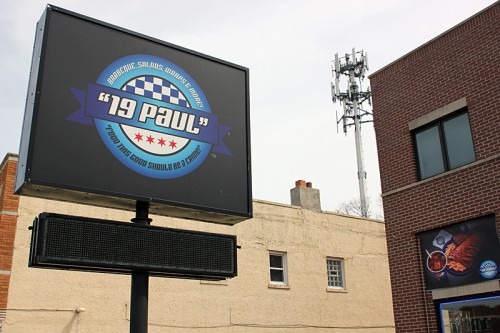
So what’s the connection? Officer Kurrin Beamon, 17-year veteran of the 7th District in Englewood, is also Kurrin Beamon, owner and pit master of 19 Paul. When we meet on a Monday morning, she’s come straight from a night shift patrolling Englewood a couple of miles north to come put meat on the smoker in time for lunch. Between the hours and the years, you might expect her to be pretty hardened, so it’s surprising that when I ask her why she wanted to get into the restaurant business, she says, softly, “I’m just blessed… just my love for food. My family always barbecued, they always had soul food. My grandmother—there was actually 19 of them, her brothers and sisters—it was just what they did. They made ice cream, they made barbecue, they made sauce, they made desserts. So I grew up eating real food, not the food that’s usually sold.”
I went around to several different restaurants, and though they were good… there was nothing that I said, I have to go back and have that again. So I try to make the food like that here.
Beamon grew up in Chicago, but in the summer her mother Marsha—the “Mama Beamon” referred to on a sign that urges you to be patient waiting for your food—would take her to visit her family in Shawneetown, a tiny town in southern Illinois near the Kentucky border. She doesn’t remember a lot about those childhood visits—”I remember frogs were jumpin’ in our hotel room. As a kid, that’s what you remember”—and only one of those 19 siblings of her grandmother’s generation is still around.
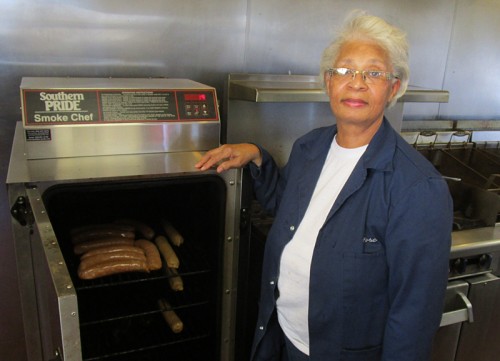
Mama Beamon at the smoker
But the long menu has a lot of passed-down family recipes on it, from the barbecue to the greens or the peach cobbler that Marsha makes. “If I had to do it all over again, [the menu] would probably be half the size of what it is now. It was mostly inexperience that made me have a menu this large. I wanted to make sure I could make everyone happy, in case they didn’t like one thing, they could have another thing,” she says.
Zero in on the barbecue and you see the influence of the south in a broader menu of meats than is typical for the south side of Chicago—there are the standard rib tips and links, but also “Top Brass” St. Louis ribs, brisket, and chicken, smoked anywhere for from four to 18 hours. A little unusually for a barbecue spot, it’s the chicken that Mama Beamon calls her daughter’s “best-kept secret.” Kurrin’s equally proud of it, especially after trying other barbecued chickens in the area—”I of course went around to several different restaurants, and—I know it’s about palate. Some people like this, some people like that—and though they were good… there was nothing that I said, I have to go back and have that again. So I try to make the food like that here.”
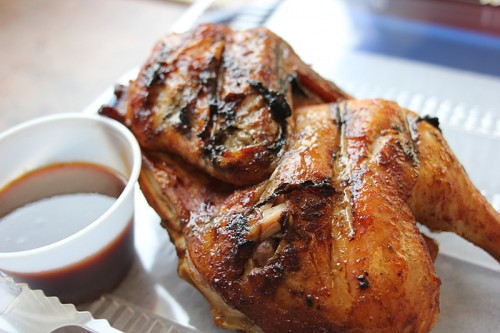
Barbecue chicken
Another thing she’s proud of is her sauce, rooted in another handed-down recipe, which she calls “midwest style—we do a mixture of sweet and tangy.” She makes a batch every couple of days, in a medium-sized pot—”I can’t do it too large, because then I can’t carry it to the stove.” She’s looking into bottling it, though she says “It’s a little expensive. I have to pay for 400 gallons of it, and the labeling and the bottling of it. So, in the near future.”
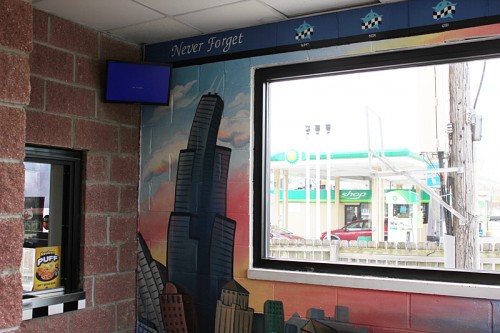
Three Englewood station officers killed in the line of duty are honored on the wall
GIVEN HER STRESS ON HER FAMILY’S heritage of barbecue, it’s a little surprising that she uses a modern device to actually cook with, a self-contained Southern Pride smoker that cooks primarily with gas, the smoke flavor coming from a small fire box. This kind of smoker is rare on the south side where open pit “aquarium” smokers are common, but they’re widely used on the north side at places like Smoque (admittedly, in a much larger form). She explains, “I love cooking in the outdoors, in my own pit, but I’m like, okay, how would I do this all year round? I did some research online, and they had the set-it-and-forget-it kind, and I said, let me see what this is all about.”
She found a dealer in Libertyville who told her, “Come out to my place, try the food, see what you think.” She thought, “Is it real barbecue if it’s cooked that way? I was a little weird about it, but he said, just come on out and try it. And I went out there, and it was awesome. It was really good barbecue. And I said, holy cow, I could do this. Add my flavors and this machine.”
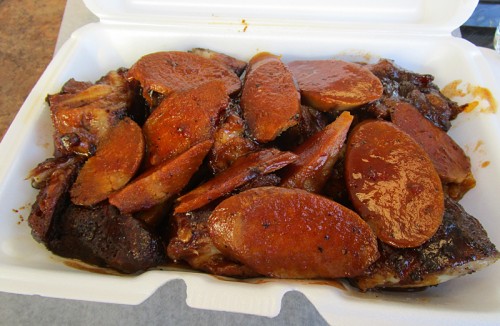
Rib tips and links
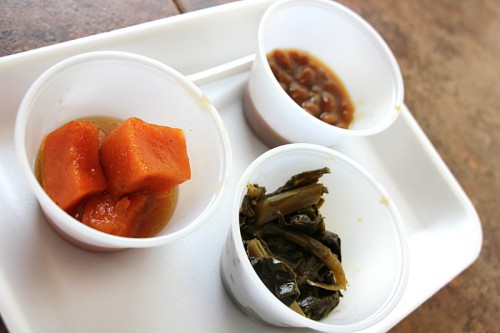
Sweet potatoes, greens and beans
So 19 Paul doesn’t offer the macho appeal of the pit master battling live flame, as many cult favorites do, but I like both the chicken and the rib tips just fine, the former living up to the promised moistness and a kiss of smoke, the latter having a deeper, more robust hickory flavor. But it’s also nice to see the full range of soul food sides, rare in barbecue restaurants—particularly the greens, which feel virtuously green yet have a porky undernote and a bit of heat to their potlikker.
She gets excited when she mentions that she just got the family recipe for a buttermilk pie she grew up eating from the last of those 19 siblings, who lives in Springfield. “That used to be one of my favorite desserts, a little sweet tooth. It’s like a custard, almost. My grandmother used to make it really thick, but my mom made it really thin. When it’s thin, it’s got too much sugar for you, but my grandmother’s had just enough.”
Her enthusiasm helps me understand a little better why someone who’s working as a police officer at night would want another, different kind of job at the same time. Even with her mom working there some days of the week, she felt like she never had a day off, so they’re trying to find a schedule that really lets her have a day off here and there. “But I know it will be worth it—someday,” she says.
“I came up making barbecue. I grew up eating good greens, I’d go over to my friend’s home and…” She crinkles her nose and laughs. “It was just a matter of my taste. You know they say, never open a restaurant just based on what you like? I did just that.”
Michael Gebert is the desk sergeant of Fooditor.
Latest
Join the Discussion
After you comment, click Post. If you're not already logged in you will be asked to log in or register with Disqus.





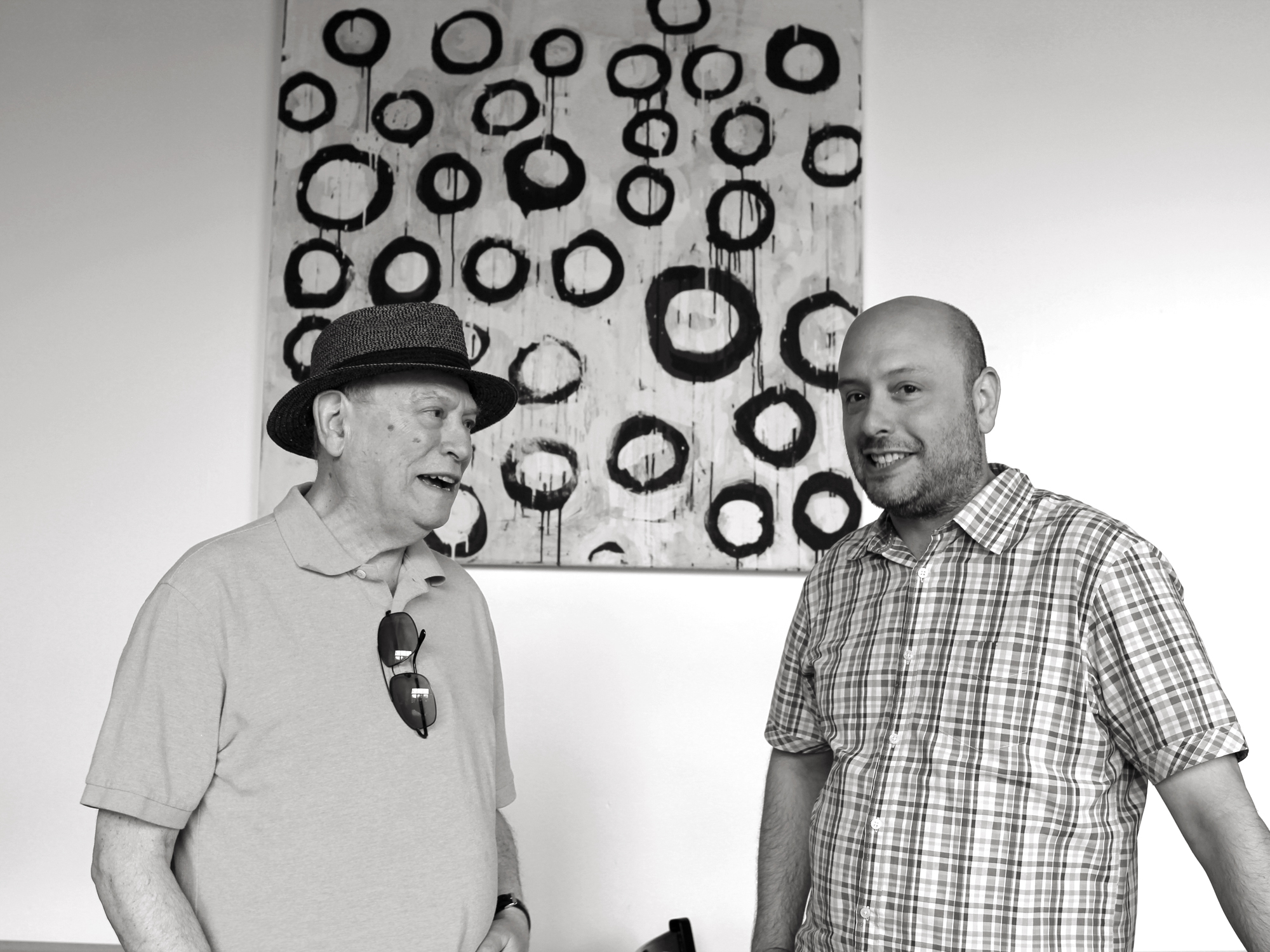
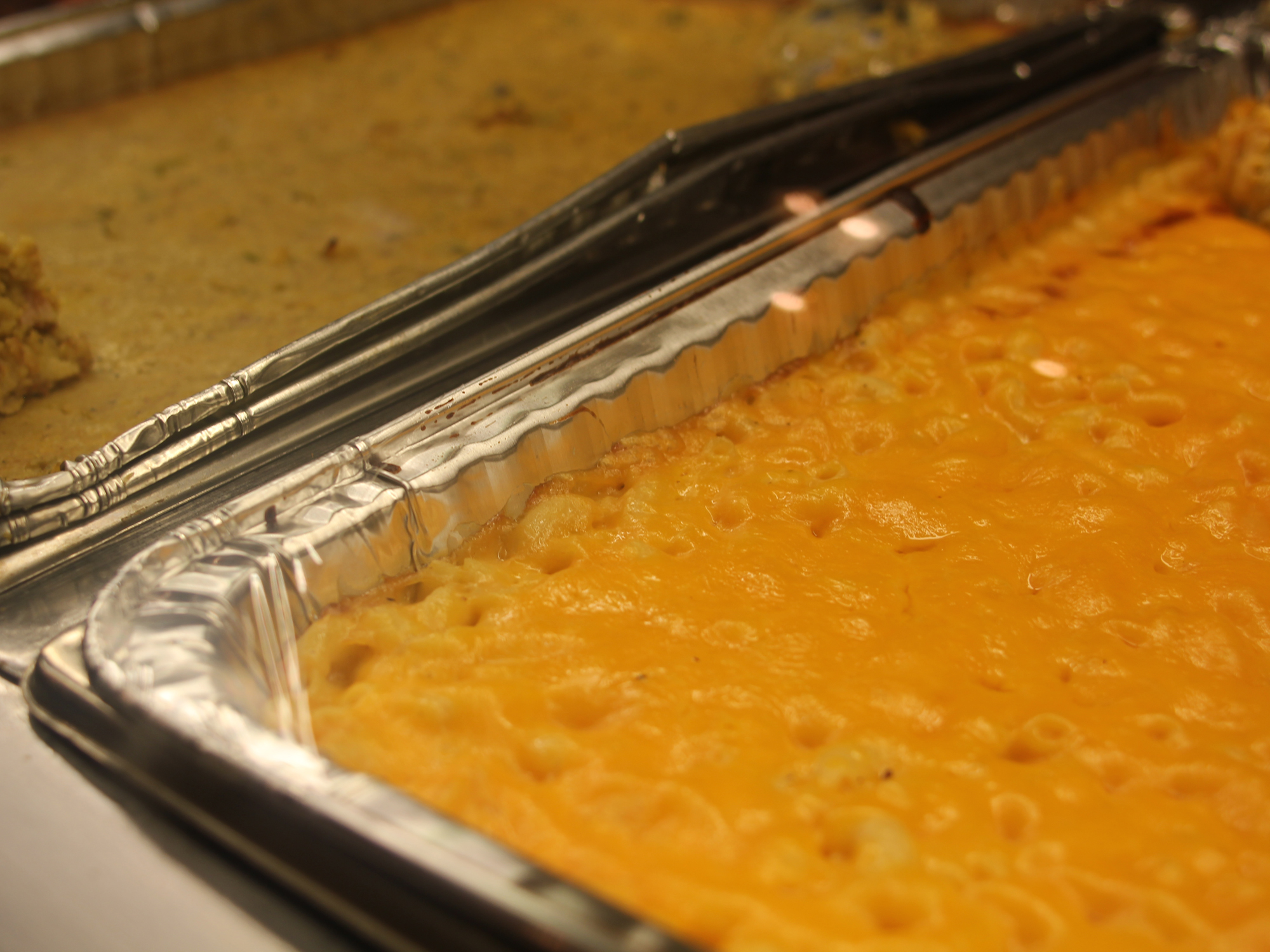
This food is excellent, give it a try!
[…] Kurrin Beamon is cooking up barbecue in Chicago at 19 Paul when she’s not working her beat as a police […]